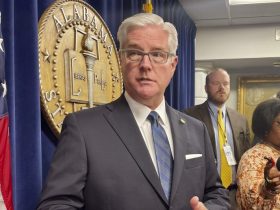Shortly before Halloween, “Saturday Night Live” aired a mildly amusing political sketch: a mock horror movie trailer featuring Democrats deciding it was time to move beyond President Biden in 2024.
But as they cycle through the alternatives for their party’s presidential nominee, they become increasingly terrified — the biggest screams come when someone slides some “Beto 2024” literature under the front door — and they ultimately land right back on Biden.
The scenario was played for laughs. But there’s definitely some truth in it — if not necessarily in the actual quality of the Biden alternatives, then in the hand-wringing involved and in the possible outcome.
Indeed, one of Biden’s saving graces ahead of a planned 2024 bid, which he could launch shortly after Tuesday night’s State of the Union address, might be the absence of a Ron DeSantis-esque rival — or really anyone close — waiting in the wings, and posing a clear, formidable alternative.
Recent polls show Democrats remain very much in favor of turning the page ahead of 2024. While that’s been the case for some time now, national Democrats had clearly hoped the surprisingly strong 2022 midterm results and improving economic signals might have a rallying effect.
Instead, a Washington Post-ABC News poll shows 6 in 10 Democratic voters continue to prefer someone else — a number with little modern precedent. And an AP-NORC poll actually showed the percentage who want Biden to run at all had dropped from 52 percent before the election to 37 percent today.
But as we’ve noted when we’ve written about this subject before, picking “someone else” invites people to imagine their ideal; actual politicians have the occasional flaw. You can only beat what’s in front of you, and you can only lose to it, too.
What’s evident is that Biden became the 2020 Democratic nominee in large part because a) none of the other candidates really caught fire with voters, and b) there was a premium on finding whoever could beat Donald Trump. Nominating the standard-issue old White male pol who served eight years as vice president very much fit the bill, even for a party that has trended more liberal and more diverse (and even as Biden’s previous presidential campaigns had flopped).
No two races are alike, but those same dynamics still exist to some extent.
Though his political stock has obviously fallen, Trump still looms as a leading 2024 GOP candidate, and if he faces a challenge from within his party, Biden can note that he’s proven he can beat Trump.
The Democratic bench is still largely composed of the candidates who didn’t really catch on in 2020. Kamala D. Harris didn’t even make it to Iowa, and she’s now an unpopular vice president whom prominent Democrats fret about — and currently polls at 2 percent in New Hampshire. The second-place finisher, Sen. Bernie Sanders (I-Vt.), is even older than Biden at 81, has now lost consecutive presidential bids, and for a time suggested he’d never run again. Only one other candidate even won a single state in 2020: now-Transportation Secretary Pete Buttigieg. And while Buttigieg is perhaps the most capable messenger in the entire party, he has demonstrated very little appeal to the diverse portions of the Democratic base, and he has found his day job to be less of a springboard than he had surely hoped.
Most early 2024 polling is heavy on these familiar names. And despite the clamor for an alternative, Biden leads the field by double-digits in virtually every national poll (though that New Hampshire poll showed Buttigieg with a narrow, five-point lead). In the few quality polls that haven’t featured Biden, all of the alternatives struggle to clear 20 percent — a far cry from a GOP race without Trump and with DeSantis.
The DeSantis comparison is also apt in another way. While polls have suggested he’s better-positioned than Trump in the general election, there’s virtually no evidence that any of the Democratic alternatives outperform Biden. Harris usually performs similarly if not slightly worse, and about the only other candidate who’s even been tested is California Gov. Gavin Newsom (D), who says he’s not running and polls similarly to Biden.
It’s possible polls might ultimately show someone like Buttigieg running better in the general election, but we haven’t seen it yet.
Given all of that, it would seem there’s an opening for someone new on the national stage. Colorado Gov. Jared Polis is perhaps the most intriguing possibility, fresh off a big reelection win and with a record that has departed from Democratic orthodoxy in some high-profile ways. Sen. Mark Kelly (D-Ariz.) and Raphael G. Warnock (D-Ga.) have earned some buzz off their own 2022 wins in marquee swing states, but they haven’t demonstrated an appetite to jump back on the campaign trail. Among the other names that tend to emerge in this conversation, Newsom and Michigan Gov. Gretchen Whitmer (D). both say they won’t run, and both Pennsylvania Gov. Josh Shapiro and Maryland Gov. Wes Moore just won their first terms a few months ago.
(West Virginia Sen. Joe Manchin III is also leaving open the possibility of a bid, but it’s difficult to believe he thinks he could win while running as a Democrat.)
Given Biden’s incumbency and the 20-30 percent floor he probably has with primary voters, there will likely be a premium on the alternative-seekers rallying behind a single alternative. But it’s also a big leap for just one or even a couple of candidates to jump into the race against an incumbent. The more likely scenarios seem to be that either nobody jumps or lots of people do.
All of which means Biden is probably better situated than the “someone else” suggested by even national polls.
It hardly means he’s a shoo-in, and his position is highly unusual. He also has to decide whether he even wants to risk his presidency ending with a primary loss, or by his ultimately being pushed aside.
But right now, with just a year until the first contests, an undefined field of alternatives works in his favor. So even though there are fewer Democrats who want Biden to run than Republicans who want Trump to run, Biden is probably in a better spot.








